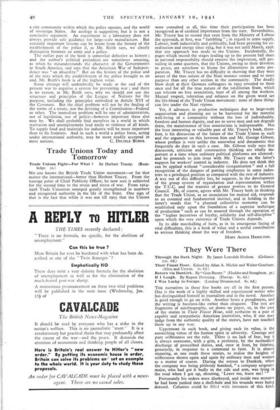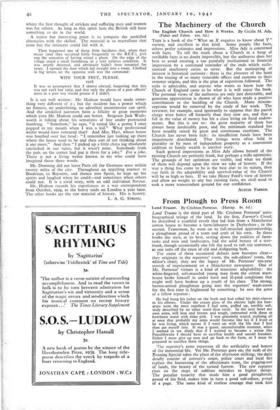They Were There
Their Finest Hour. Edited by Allan A. Michie and Walter Graebner. (Allen and Unwin. 7s. 6d.)
THE narratives in these five books are all in the first person. One is the work of a highly skilled and experienced writer who has distinguished himself in journalism and in the novel. Another is good enough to go on with. Another bears a pseudonym, and the writing is business-like rather than eloquent. The rest are fragments of autobiography, set down on paper, or, in the case of the stories in Their Finest Hour, told verbatim to a pair of capable and sympathetic American journalists, who, if one may judge from the authentic quality of the stories, have not touched them up in any way.
Uppermost in each book, and giving each its value, is the astonishing virtue of the human spirit in adversity. Courage and pure selflessness are the rule. There is no. lack of fear, but it is always overcome, with a grin, a profanity, by the methodical discharge of prescribed duties, and, once at least, by fainting, genuinely, in response to a command to faint. It is almost stunning, as one reads these stories, to realise the heights of selflessness shown again and again by ordinary men and women as a matter of course. During the retreat to Dunkirk, when the company was being pitilessly bombed, " a company sergeant- major, who had got it badly in the side and arm, was lying in the road when I got up, shouting, ' Leave me, leave me! ' " Fortunately his orders were disobeyed, and inside two minutes he had been yanked into a shell-hole and his wounds were being dressed. Columns could be filled with instances of this kind,
where the first thought of stricken and suffering men and women was for others. As long as this spirit lasts the British still have something to do in the world.
A minor but interesting point is to compare the unskilled chronicles with the skilled. The material is so marvellous that none but the insincere could fail with it.
Then happened one of those little incidents that, when they occur (and they occurred fairly frequently to the B.E.F.), give one the sensation of having raised a ghost. On the edge of the village stood a small farmhouse in a very ruinous condition. It was utterly deserted, and obviously hadn't been tenanted for years. I opened the door which led straight into a room. Chalked in big letters on the opposite wall was the command: WIPE YOUR FEET, PLEASE.
1918.
It was so peremptory that I almost obeyed, forgetting that this was not 1918 but 1939, and that only the ghosts of a past officers' mess in a past war would grouse if I didn't.
It is not well written : Mr. Hodson would have made some- thing very different of it ; but the incident has a power which no flatness, no underlining, no adverbial incontinence can spoil. And the unskilled narrators have a felicity at great moments which even Mr. Hodson could not better. Sergeant Jack Wads- worth is talking about his sensations of fear under protracted bombing. " Somehow," he says, " it tasted like a penny I once popped in my mouth when I was a kid." What professional writer would have ventured that? And Mrs. Hart, whose house was bombed over her head : " I remember just looking up there where the house used to be and then sort of not thinking about it any more." And then " I picked up a little china jug absolutely uncracked in our ruins, but it wasn't mine. Somebody from the pub. on the corner had put it there for a joke." For a joke. There is not a living writer known to me who could have imagined those three words.
Mr. Downing did not leave Paris till the Germans were within twenty miles of the city. Throughout an appalling journey to Bordeaux, to Bayonne, and thence into Spain, he kept up his spirits and laughed when he could—and sometimes when others could not It is a yivid story, with an odd individual flavour. Mr. Hodson records his experiences as a war correspondent from October, 5939, to the heavy raids on London- a year later. The other books are the raw material of history. His is history. L. A. G. STRONG.



























 Previous page
Previous page